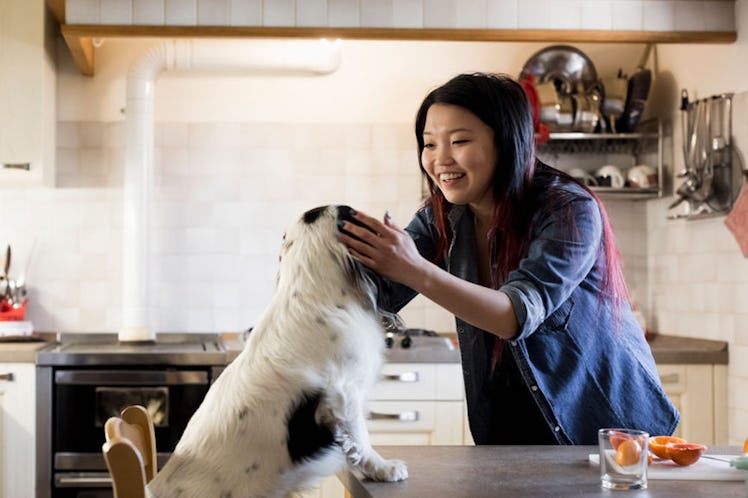
Here's What A Vet Wants You To Know If You Usually Feed Your Pup Raw Dog Food
While my dog Hank tolerates crunchy dog kibble, he goes absolutely wild for any raw-meat dog food. The moment he gets a whiff of the fancy stuff (which I usually save for special occasions), he begins to run in circles because he just can't contain his excitement. I always feel like a good dog mom when I give him the little treat, but is raw dog food dangerous? I always feel a little bit weirded out by the idea that so many of the brands are sold at room temperature, TBH, and according to the results of a new study, I might have good reason to be a little skeptical of the stuff.
In the study, which has been published in the veterinary medicine journal Veterinary Record, researchers purchased 60 packs of raw meat products for dogs between March and September 2017 from 10 different European manufacturers to examine them for bacteria. The results of their tests were pretty shocking: "Enterobacteriaceae were detected in all 60 samples and in 31 samples exceeded a level of 5000 bacteria per gram," the researchers wrote, "which is the threshold for satisfactory microbial hygiene according to EU regulations." What's more, four samples included salmonella, which could pose a significant health risk to your dog.
As sad as it is to think about your pup getting sick, she's not the only one who's at risk if she eats contaminated food. According to the Centers for Disease Control and Prevention (CDC), salmonella is a zoonotic disease, which means it can spread from animals to humans (and then humans to humans) for up to six weeks after the animal is first infected. The biggest danger lies in coming in contact with your dog's poop, so the health agency recommends very thorough hand-washing after any contact with animal feces. (In case you want a refresher on hand-washing best practices, the CDC has a helpful guide.)
As far as your pup's food bowl is concerned, unfortunately, it can indeed pose a risk if you're feeding her raw dog food. "If there are not extreme hygiene practices in place, like bleaching any area the food comes into contact with immediately after use (bowls, counters, utensils, etc.), there is great risk of sickness," says Dr. Katy Nelson, a veterinarian at the Belle Haven Animal Medical Centre. You should also take care to wipe your dog's mouth and furry "beard" after each meal to prevent bacterial transfer, she tells Elite Daily in an email.
According to Dr. Nelson, questionable regulation practices for these raw dog foods has led to many recent recalls due to bacterial contamination. But even if that doesn't scare you, she also points out that raw dog food might not even be nourishing your pup properly. "Many raw diets are created by boutique manufacturers and can lack essential nutrients to make the diet complete and balanced," Dr. Nelson explains.
"A much healthier way of accomplishing complete and balanced nutrition without compromising taste and bioavailability of the protein source (the reason most people switch to raw)," she tells Elite Daily, "is to go with a fresh cooked food, like Freshpet, that contains healthy proteins, carb sources, and essential vitamins and minerals." This will ensure that your pup is getting the balanced diet she needs to dash around the dog park and energetically greet you each time you come home.
If you aren't quite ready to switch up your dog's food, just be sure to keep an eye out for signs that the diet might not be a good fit, suggests Dr. Nelson. Some potential signs include weight fluctuation, vomiting, diarrhea, gas, aversion to the food, poor quality fur coat, itching or chewing themselves, dry nose and/or paws, skin or ear infections, lethargy, or depression. "Any of these are serious issues and should be addressed with a veterinarian," she tells Elite Daily.
You should also check in with your doctor if you experience nausea, stomach cramps, stomach pain, diarrhea or fever, Dr. Nelson adds, as these could be signs of exposure to harmful bacteria.